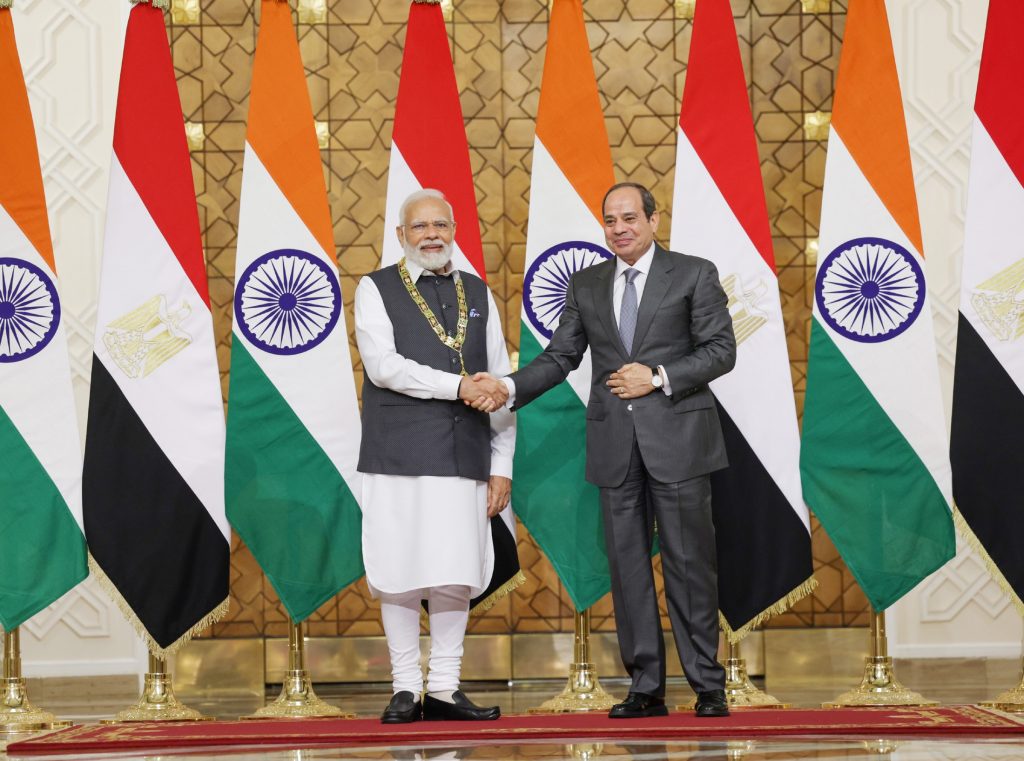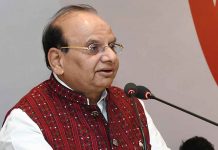
The PM’s visit to Egypt is expected to boost the bilateral ties between the two countries, with the two sides expected to put in place arrangements to ramp up cooperation in areas ranging from security to trade and investment.
The belated visit of the Indian PM Narendra Modi to Egypt, on June 24-25 this year is an attempt to re-establish the warm ties, the two countries they had during fifties and sixties, the cold war era. An Indian PM visited the country after a gap of 26 years, and seven years after the visit of the Chinese President, Xi Jinping, who had travelled to Egypt in 2016 offering billions of USD investment in the Suez Canal Economic Zone (SCZONE).
A pretty Egyptian woman, Jena, dressed in a traditional Indian saree, compensated for this delayed Indian response, when she warmly welcomed Modi with the popular song ‘Yeh Dosti Hum Nahi Chhodenge’ from the movie ‘Sholay’ meaning that we would never abandon our friendship. It was also a surprise for the PM, when she revealed her limited knowledge of Hindi and never having visited India before. He warmly responded by saying that “Kisi ko pata bhi nahi chalega ki aap Misr ki beti ho ya Hindustan ki beti ho (Nobody will be able to tell whether you are an Egyptian or Indian woman).
In spite of the love and affection India enjoys in Egypt, her leadership has to invest in the country on a much larger scale than was planned. The Chinese assistance had begun in 2008 with the setting up of the Tianjin Economic-Technological Development Area. During the past 15 years, Chinese have already initiated a number of projects in textiles, power generation, apparel and fashion and other industries, worth tens of millions of dollars at the Suez, Sokhna and Abu Khalifa. With its excellent access to the African and Arab markets, the Egyptian industrial zone has become a coveted destination for the Chinese industries and investors.
After this prolonged gap of her low-key relationship with Egypt, the Indian efforts to regain ties with the country had begun following the visits of the Egyptian President, Abdel Fattah el-Sisi, who had also graced the Republic day Parade in 2022 as the chief guest. Both sides appear to be keen for reinventing their bilateral close relationship, which they had during the fifties and sixties.
Just a day before Modi’s arrival in Cairo, a high-power delegation was having meetings with senior officials and businessmen in New Delhi and Mumbai for setting up industrial units at the SCZONE. Waleid Gamal El Dien, Chairman of the SCZONE, who was leading the four-day promotional tour in New Delhi and Mumbai, announced the launch of the Indian “Platinum” project, the leading Indian company in the manufacture of additives and PVC stabilizers, within the industrial developer, Orascom Industrial Parks. India will be investing USD 20 million in this project in the next two-three months.
Initially, the response of the Indian investors to the SCZONE has been slow, which was set up in 2015 and despite being strategically located at the intersection of major international shipping routes providing easy access to global markets. It encompasses an area of over 461 square kilometres and is located along the eastern and western banks of the Suez Canal.
During the past seven years, its infrastructure was further improved with a new major expressway linking it to the regional network, six new road and rail tunnels to increase cross-canal connectivity, seven underwater tunnels under the Canal to link Sinai Peninsula to Egypt’s mainland, power, water and tele-communications networks to support integrated development, and the dry port projects at Ismailia and 10th Ramadan to boost the region’s logistical capacity.
Modi’s Agenda
Modi’s official visit to Egypt is expected to boost their bilateral ties, with the two sides expected to put in place arrangements to ramp up cooperation in areas ranging from security to trade and investment. They may also set up joint ventures for producing military equipment. The Egyptian ambassador, Wael Mohamed Awad Hamed, in New Delhi has told Indian media that Modi’s visit is going to be a game changer, because his visit is expected as a confidence-building measure.
The leaders of the two countries are expected to propose a road map for working together benefitting each country, but also for the rest of the countries of the region, especially Global South. It may be noted that India has already invited Egypt as a guest country during her G20 presidency.
The last bilateral visit by an Indian prime minister, I.K. Gujaral, to Egypt was in 1997. At that time, there was a different leadership in Egypt and in India, and the world was different. The whole world, the international context and the polarisation was different. It is hoped that with Modi’s visit to Egypt, the relations between the two countries would regain the same momentum they had in the 1950s and 1960s.
New Alignments in West Asia
Modi’s visit comes at a time when West Asia is witnessing a change. Saudi Arabia and Iran have restored their diplomatic ties. India is getting the attention of the Egyptian leaders for closer economic ties, when other countries in the region are seeking Chinese support and investments. It is being stated that the two countries are re-inventing their old ties of the “non-aligned era, when they had decided to remain neutral from the big power rivalries i.e. between the US and the USSR. With the new emphasis on closer economic ties, India and Egypt may not only regain old ties, they may also work more closely together, with Egypt serving as a gateway not just to the Arab world but also to Africa.
During his two-day schedule in Egypt, Modi visited the Helopolis War Memorial of 3779 Indian soldiers, who were martyred during the World War-I defending Egypt in various battles against the armies of the Ottoman Empire. His visit to the 11th century Al-Hakim mosque built during the reign of the Fatimid dynasty reaffirms India’s old ties with the region. The Bohra community, known as accomplished businessmen in India, are mostly settled in the Western India. They have a large presence at Siddhpur, Mehsana and Gujarat, and they trace their origin from the Fatimid dynasty. The political and religious persecution in Egypt had forced them to take refuge in India.
Meeting With Ministers
The visit is seen as an attempt by India to strengthen its ties with Egypt, a key regional player in the Middle East. India is looking to expand her trade and investment ties with Egypt, and seeks cooperation in the fight against terrorism. Modi has also participated in a roundtable discussion with the India Unit of the Egyptian Cabinet. Apart from having interaction with ministers and government officials, he also met Egypt’s grand mufti, Dr Shawki Ibrahim Abdel-Karim Allam, and later held discussions with prominent Egyptian intellectuals.
Meanwhile, India’s ambassador to Egypt, Ajit Gupte told the Indian news agency that India’s multi-faceted relations with Egypt, now being elevated to a strategic partnership, would be receiving further impetus with the first state visit of Modi to this key Middle East nation.
The warm welcome accorded to Modi in Cairo indicates that the Egyptian leaders do not want the investments only from China, which is expected to reach USD three billion this year, but want to diversify with investments from other countries. Since India enjoys credibility and trust, the Indian participation is likely to increase in a big way, especially during the forthcoming visit of El-Sisi to India in September for the G-20 Summit where Egypt has been invited as a special guest.













